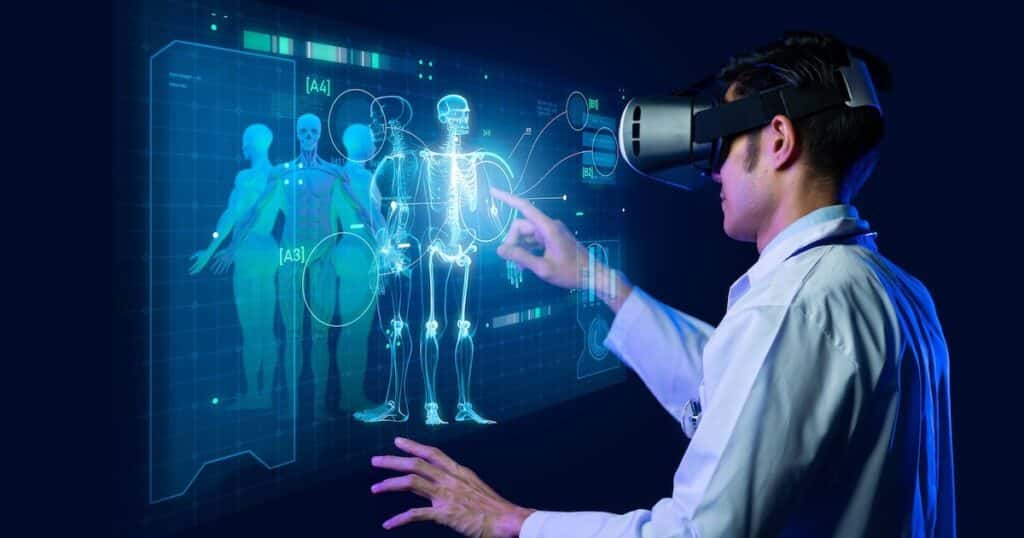The intersection of Artificial Intelligence (AI) and healthcare is ushering in a new era of medical diagnosis and treatment. AI technologies are transforming the healthcare landscape, offering innovative solutions that enhance the accuracy and efficiency of medical processes. In this article, we will delve into the remarkable ways AI is revolutionizing the healthcare sector, with a focus on specific applications that are reshaping the future of medical care.
AI in Medical Imaging Analysis
One of the most notable contributions of AI to healthcare is in the realm of medical imaging analysis. Medical imaging, including X-rays, MRIs, and CT scans, plays a crucial role in diagnosing and monitoring various medical conditions. AI-powered algorithms are now capable of analyzing these images with exceptional precision.
AI-driven image recognition: AI algorithms can detect abnormalities, tumors, fractures, and other anomalies in medical images, often with greater accuracy than human radiologists. This capability accelerates the diagnostic process, leading to faster treatment initiation.
Early disease detection: AI can identify subtle signs of diseases at an earlier stage when they are more treatable. For example, AI algorithms can spot early signs of cancer, enabling timely intervention and potentially saving lives.
Reducing radiologist workload: AI can assist radiologists by automating routine tasks, allowing them to focus on more complex cases and improving overall workflow efficiency.
Personalized Treatment Plans
Another groundbreaking application of AI in healthcare is the development of personalized treatment plans. Each patient’s medical history, genetic makeup, and response to treatments are unique, making one-size-fits-all approaches less effective. AI helps tailor treatment plans to individual patients, optimizing outcomes.
Genomic medicine: AI analyzes a patient’s genetic data to identify specific mutations or variations that may influence disease susceptibility or treatment response. This information allows for the design of personalized treatments and therapies.
Predictive analytics: AI algorithms can predict a patient’s response to various treatment options based on historical data and clinical parameters. This assists healthcare providers in selecting the most effective and least risky treatment course.
Continuous monitoring: Wearable devices and AI-powered health applications can continuously monitor a patient’s vital signs and health metrics. In case of deviations or concerning trends, healthcare providers can intervene promptly.
Enhancing Patient Care
AI is also enhancing the overall quality of patient care by improving communication, reducing errors, and increasing accessibility to medical services.
Telemedicine and virtual healthcare: AI-driven telemedicine platforms provide patients with remote access to healthcare professionals, enabling consultations, diagnoses, and monitoring without the need for in-person visits.
Voice recognition and natural language processing: AI-powered chatbots and virtual assistants can assist patients in scheduling appointments, obtaining information, and even providing initial medical advice.
Data-driven decision support: AI helps healthcare providers make informed decisions by analyzing vast amounts of patient data, research findings, and clinical guidelines.
Challenges and Ethical Considerations
While AI holds immense promise in healthcare, it also poses challenges and ethical considerations. Patient data privacy, the potential for bias in AI algorithms, and regulatory compliance are among the issues that need careful attention.
The Future of AI in Healthcare
The future of AI in healthcare is bright, with ongoing research and development focused on further refining AI algorithms and expanding their applications. AI-driven drug discovery, robotics-assisted surgery, and predictive analytics for disease outbreaks are just a few areas where AI is expected to make significant contributions.
In conclusion, AI is revolutionizing medical diagnosis and treatment in ways that were once unimaginable. From improving the accuracy of medical imaging analysis to tailoring treatment plans to individual patients, AI is enhancing patient care and outcomes. While challenges exist, the potential benefits are transformative. The future of healthcare is increasingly AI-driven, and it promises to be more precise, efficient, and patient-centric than ever before.
